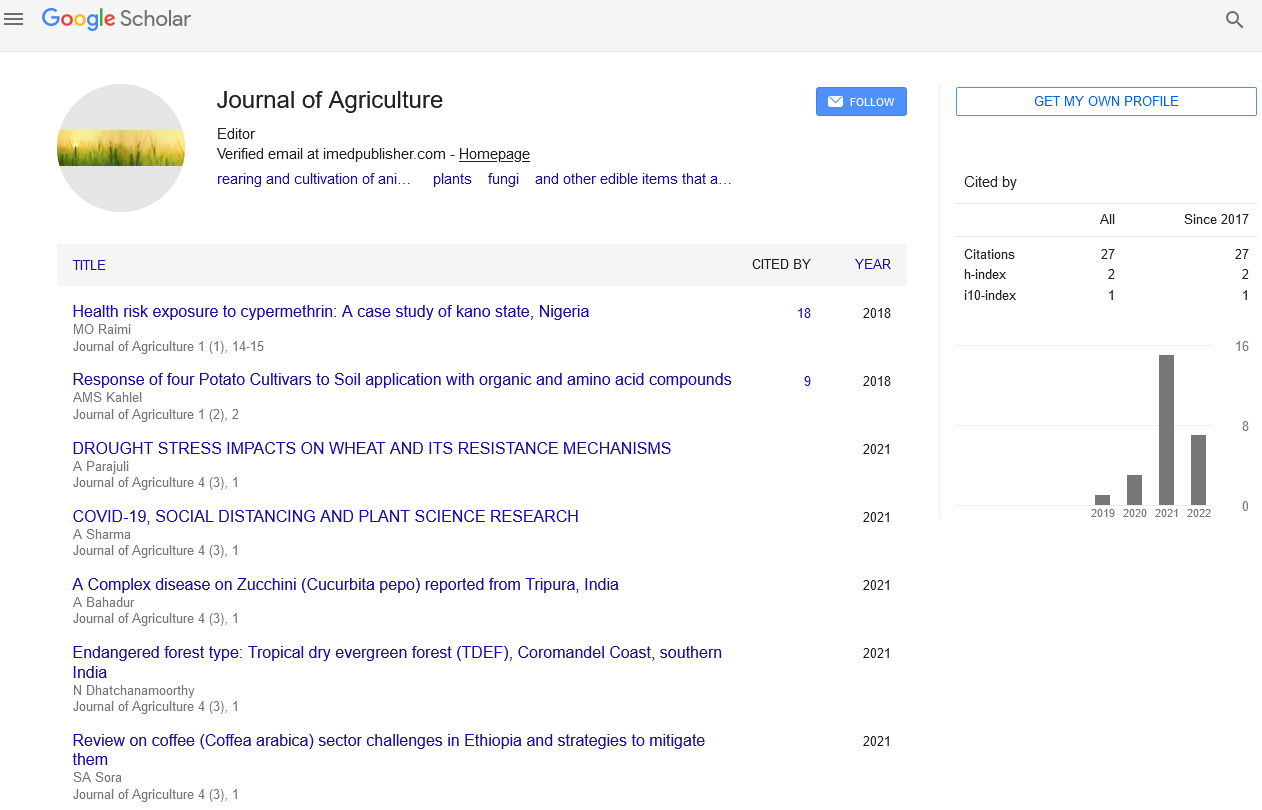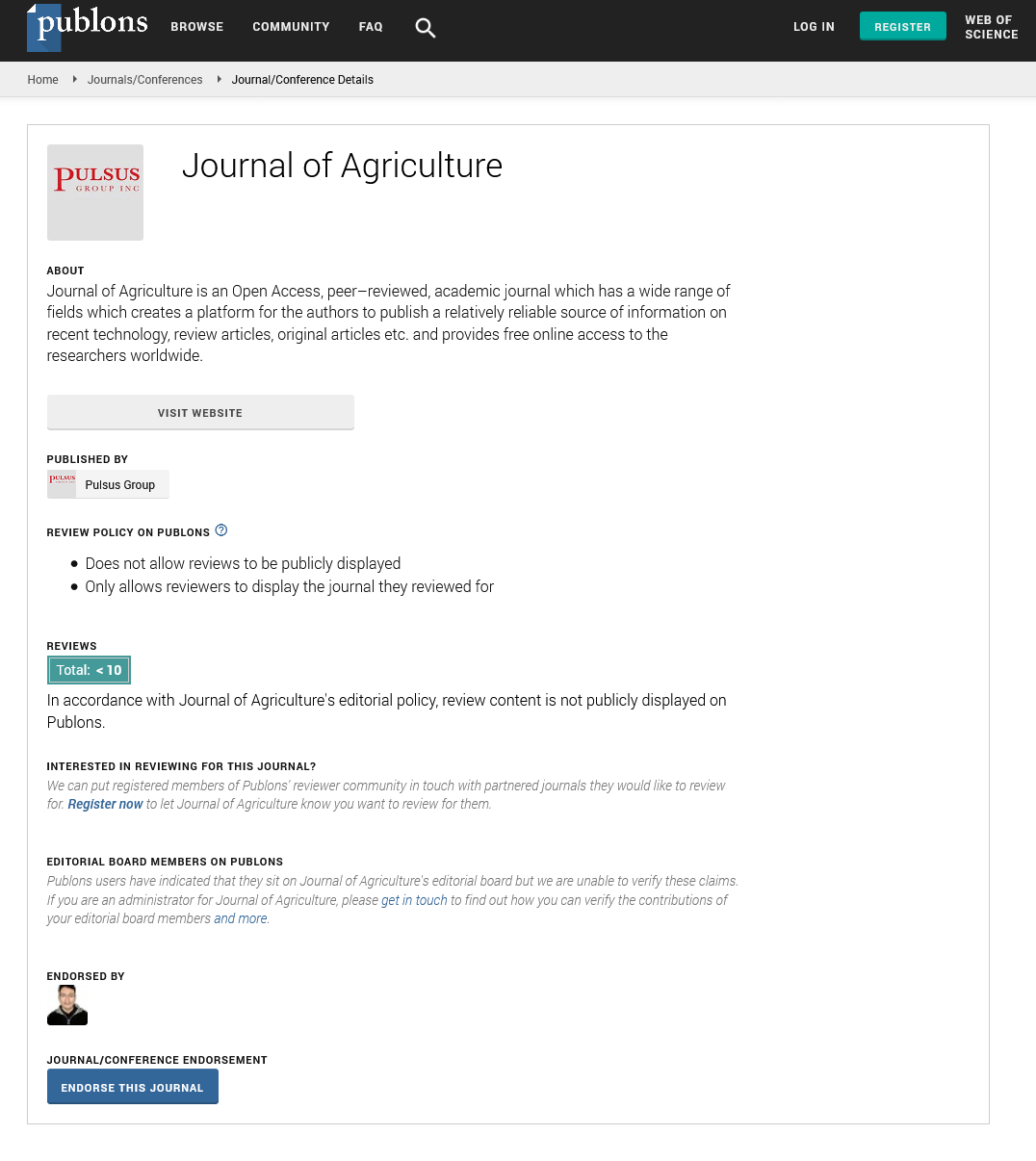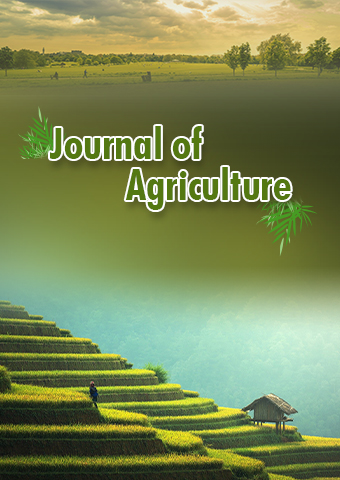Editorial - Journal of Agriculture (2023) Volume 6, Issue 3
Understanding the Interaction of Markets, Policies, and Sustainability in Agricultural Economics
Sekhor Rajput*
Department of Agriculture, Agricultural University, India
Department of Agriculture, Agricultural University, India
E-mail: Rsekhor123@gmail.com
Received: 31-May-2023, Manuscript No. jagri-23-102482; Editor assigned: 02-Jun-2023, Pre-QC No. jagri-23-102482 (PQ); Reviewed: 16- Jun-2023, QC No. jagri-23-102482; Revised: 21-Jun-2023, Manuscript No. jagri-23-102482 (R); Published: 28-Jun-2023; DOI: 10.37532/
Abstract
The field of agricultural economics is at the forefront of addressing the complex challenges posed by the increasing global demand for food, coupled with the urgent need for sustainable agricultural practices. This abstract provides a concise overview of the interplay between markets, policies, and sustainability in the context of agricultural economics. The interactions between agricultural markets and sustainability are explored. Market dynamics significantly influence the allocation of resources, production decisions, and pricing of agricultural commodities. Sustainable agricultural practices seek to balance economic viability with environmental and social considerations. Understanding these interactions is vital to ensure long-term food security while minimizing adverse environmental impacts. The role of policies in shaping agricultural systems and promoting sustainability is examined. Government policies, international agreements, and incentives play a pivotal role in influencing agricultural practices. Effective policies can stimulate innovation, encourage sustainable practices, and foster resilient food systems, while inadequate policies may lead to overexploitation of resources and environmental degradation. Sustainable agricultural practices are often perceived as costlier and may face challenges in competing with conventional methods. Understanding these market dynamics is crucial to create a level playing field, enabling sustainable agricultural practices to thrive and address the growing demand for environmentally friendly products. Data analysis can illuminate the potential impacts of different policies on agricultural markets and sustainability outcomes, facilitating informed choices that align economic prosperity with environmental preservation. In conclusion, the interaction of markets, policies, and sustainability in agricultural economics is a complex and multifaceted area that necessitates a holistic approach. A comprehensive understanding of these interactions is vital for developing effective policies, promoting sustainable practices, and ensuring food security for future generations. By addressing these challenges collaboratively, agricultural economics can become a powerful tool in building a resilient and sustainable global food system
Keywords
Agricultural economics • Sustainable agricultural • Market dynamics • Environmental degradation
Introduction
Agricultural economics plays a critical role in the global economy, as it encompasses the study of the production, distribution, and consumption of food and fibre. In recent years, the nexus between markets, policies, and sustainability has emerged as a vital area of research and concern. As the world faces pressing challenges, such as food security, climate change, and resource depletion, understanding the intricate interplay between these three factors becomes increasingly crucial. This article explores the complex interaction of markets, policies, and sustainability in agricultural economics, highlighting their significance and potential solutions [1, 2].
The Role of Agricultural Markets
Agricultural markets are the primary mechanisms through which farmers and agribusinesses exchange goods and services with consumers. These markets are influenced by various factors, including supply and demand dynamics, production costs, technological advancements, and global trade [3]. Understanding these market forces is essential for policymakers and farmers to make informed decisions.
The Impact of Agricultural Policies
Government policies significantly shape the agricultural sector. Subsidies, trade agreements, price controls, and regulations can profoundly impact farmers’ behaviours and market outcomes. For instance, subsidies may encourage farmers to grow certain crops or adopt specific practices, while trade agreements can affect the flow of agricultural products across borders [4]. Well-designed policies can enhance food security, stimulate rural development, and promote sustainable practices.
Embracing Sustainability in Agriculture
Sustainability in agriculture refers to the ability to meet the present needs of society without compromising the ability of future generations to meet their own needs. Sustainable agricultural practices focus on preserving natural resources, reducing waste, promoting biodiversity, and mitigating climate change impacts. Implementing sustainable practices is crucial to ensure the long-term viability of the agricultural sector and protect the environment [5].
Market-Policy-Sustainability Nexus
The intricate interplay between markets, policies, and sustainability in agricultural economics becomes evident when examining specific case studies. For instance:
Price Volatility and Food Security: Fluctuations in global commodity prices can impact food prices and availability. In times of price volatility, appropriate policies and interventions are essential to protect vulnerable populations from food insecurity [6].
Environmental Regulations and Sustainable Farming: Policymakers can promote sustainable agriculture by implementing environmental regulations that encourage responsible land use, water management, and reduced chemical inputs [7].
Trade Policies and Sustainable Development: International trade agreements can support sustainable agricultural practices by promoting fair trade, reducing barriers, and encouraging environmentally friendly production methods [8].
Achieving a Balance: Challenges and Solutions
Agricultural economics faces numerous challenges in achieving a balanced relationship between markets, policies, and sustainability:
Conflicting Objectives: Sometimes, economic goals might clash with environmental sustainability objectives. Striking a balance requires innovative policies that encourage sustainable practices while supporting farmers’ livelihoods [9].
Lack of Information: Access to accurate and timely data is crucial for policymakers to make informed decisions that promote sustainability in agriculture.
Inequality and Food Access: Market forces and policies may exacerbate inequalities, affecting food access for vulnerable populations. Addressing this requires targeted interventions and social safety nets [10].
Climate Change: Global warming poses significant threats to agriculture. Policy frameworks should prioritize sustainable practices and resilience to climate impacts.
Conclusion
Understanding the interaction of markets, policies, and sustainability in agricultural economics is pivotal for ensuring food security, economic stability, and environmental preservation. By promoting sustainable agricultural practices through well-designed policies, the world can address the challenges of the 21st century and build a resilient and prosperous agricultural sector that benefits both present and future generations. Policymakers, researchers, and stakeholders must collaborate to foster innovation and create a sustainable agricultural future.
References
- Belmain S, Stevenson P. Ethnobotanicals in Ghana: reviving and modernising age-old farmer practice. Pesticide Outlook. 12(6), 233-238 (2001).
- Himesh S, Rao EP, Gouda KC et al. Digital revolution and Big Data: a new revolution in agriculture. CABI Reviews. 221-7(2018).
- Mousavi SR, Rezaei M Nanotechnology in agriculture and food production. J Appal Environ Biol Sci.1 (10), 414-9(2011).
- Adekola KA, Alabadan BA, Akinyemi TA China Agricultural mechanization development experience for developing countries. j agric res innov. 3(2), 655-8(2014).
- Raj M, Shashank G, Vinay C et al. A survey on the role of Internet of Things for adopting and promoting Agriculture 4.0.J Netw Comput Appl. 187, 103-107(2021).
- Isman MB. Botanical insecticides: for richer, for poorer. Pest Manag Sci. 64(1), 8-11 (2008).
- Wingren G, Fredrikson M, Brage HN et al. Soft tissue sarcoma and occupational exposures. Cancer. 66, 806-811 (1990).
- Forestier E, Grace J, Kenny C Can information and communication technologies be pro-poor. Telecomm Policy. 26 (11), 623–646 (2002).
- Islam SM, Gronlund AG. Factors Influencing the Adoption of Mobile Phones Among the Farmers in Bangladesh: Theories and Practices. Int j adv. eng Technol. 4(1), 4-14(2019).
- Lahat G, Lazar A, Lev D et al. Sarcoma epidemiology and etiology: potential environmental and genetic factors. Surg Clin North Am. 88, 451-481 9 (2008).
Indexed at, Google Scholar, Crossref
Indexed at, Google Scholar, Crossref
Indexed at, Google Scholar, Crossref
Indexed at, Google Scholar, Crossref
Indexed at, Crossref, Google Scholar


